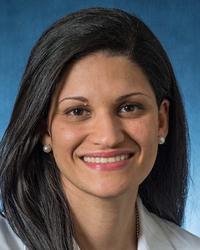Research Lab Results
-
Amita Gupta Lab
The Amita Gupta Lab focuses on drug trials to prevent and treat HIV, tuberculosis (TB) and other co-morbidities in adults, including pregnant women and children who reside in low-income settings. We also conduct cohort studies assessing HIV, inflammation and nutrition in international settings; TB in pregnancy; and risk factors for TB in India (CTRIUMPH). We collaborate with several faculty in the Center for TB Research, Division of Infectious Diseases and the School of Public Health.
-
Yukari Manabe Lab
Investigators in the Yukari Manabe Lab evaluate the accuracy of rapid, point-of-care diagnostics for HIV, tuberculosis and related infectious diseases in resource-limited settings particularly sub-Saharan Africa and examine the impact of diagnostic interventions on disease detection and patient outcomes. The team also conducts operational and translational research in tuberculosis and HIV co-infection.
-
David Dowdy Lab
The David Dowdy Lab conducts research in the field of infectious disease epidemiology. We use an interdisciplinary approach that involves infectious disease modeling, health economics, classical epidemiology, and operational and implementation science. Much of our work explores the diagnosis and treatment of tuberculosis. We also have a longstanding interest in “translational epidemiology,” with a goal of developing methods to help medical professionals who use epidemiological data make decisions that are in the best interest of patients and public health.
-
Eric Nuermberger Lab
Research in the Eric Nuermberger Lab focuses primarily on experimental chemotherapy for tuberculosis. We use proven murine models of active and latent tuberculosis infection to assess the effectiveness of novel antimicrobials. A key goal is to identify new agents to combine with existing drugs to shorten tuberculosis therapy or enable less frequent drug administration. We're also using a flow-controlled in vitro pharmacodynamic system to better understand the pharmacodynamics of drug efficacy and the selection of drug-resistant mutants during exposure to current agents.
-
Elizabeth Tucker Lab
Research in the Elizabeth Tucker Lab aims to find treatments that decrease neuroinflammation and improve recovery, as well as to improve morbidity and mortality in patients with infectious neurological diseases. We are currently working with Drs. Sujatha Kannan and Sanjay Jain to study neuroinflammation related to central nervous system tuberculosis – using an animal model to examine the role of neuroinflammation in this disease and how it can differ in developing brains and adult brains. Our team also is working with Dr. Jain to study noninvasive imaging techniques for use in monitoring disease progression and evaluating treatment responses. -
William Bishai Laboratory
The William Bishai Laboratory studies the molecular pathogenesis of tuberculosis. The overall goal of our laboratory is to better understand tuberculosis pathogenesis and then to employ this understanding toward improved drugs, vaccines and diagnostics. Since Mycobacterium tuberculosis senses and adapts to a wide array of conditions during the disease process, it is clear that the regulation of expression of virulence factors plays an important role in pathogenesis. As a result, a theme of our research is to assess mycobacterial genes important in gene regulation. We are also interested in cell division in mycobacteria and the pathogenesis of caseation and cavitation. -
Karakousis Lab
The Karakousis Lab is primarily focused on understanding the molecular basis of Mycobacterium tuberculosis persistence and antibiotic tolerance. A systems biology-based approach, including the use of several novel in vitro and animal models, in combination with transcriptional, proteomic, genetic, imaging, and computational techniques, is being used to identify host cytokine networks responsible for immunological control of M. tuberculosis growth, as well as M. tuberculosis regulatory and metabolic pathways required for bacillary growth restriction and reactivation. In particular, we are actively investigating the regulatory cascade involved in the mycobacterial stringent response. Another major focus of the lab is the development of host-directed therapies for TB, with the goal of shortening treatment and improving long-term lung function. Additional research interests include the development of novel molecular assays for the rapid diagnosis of latent TB infection and active TB disease, and for the detection of drug resistance. -
Lamichhane Lab
Our research focuses on the biology of the peptidoglycan of Mycobacterium tuberculosis, the organism that causes tuberculosis, and Mycobacteroides abscessus, a related bacterium that causes opportunistic infections. We study basic mechanisms associated with peptidoglycan physiology but with an intent to leverage our findings to develop tools that will be useful in the clinic to treat mycobacterial infections. Peptidoglycan is the exoskeleton of bacteria that not only provides structural rigidity and cell shape but also several vital physiological functions. Breaching this structure is often lethal to bacteria. We are exploring fundamental mechanisms by which bacteria synthesize and preserve their peptidoglycan. Although our lab uses genetic, biochemical and biophysical approaches to study the peptidoglycan, we pursue questions irrespective of the expertise required to answer those questions. It is through these studies that we identified synergy between two beta-lactam antibiotics against select mycobacteria. -
Natasha Chida Lab
The Natasha Chida Lab investigates methods for using education and curriculum development to improve patient outcomes worldwide, primarily by optimizing education of physicians-in-training. Most recently, our team has worked to develop and evaluate an assessment tool for evaluating internal medicine residents’ understanding of tuberculosis diagnostics. Previous research includes a retrospective cohort study on the high proportion of extrapulmonary TB in a low-prevalence setting as well as an analysis of ways to define clinical excellence in adult infectious disease practice.
-
IndoUS Clinical Research
Our IndoUS team, based both in Baltimore and in India, specializes in international clinical research (cohort studies and clinical trials), public health implementation science and education in infectious diseases, HIV/AIDS, tuberculosis (TB), vaccine preventable illnesses, antimicrobial resistant infections, and more recently COVID. Since 2003, our work has been focused primarily on India, where we are engaged in several Indo-JHU and international research collaborations. We partner with several leading medical and research institutions in India (e.g. BJGMC, DY Patil, Hinduja Hospital, KEM, Bharati Vidyapeeth, NIRT, JIPMER, CMC, Medanta, IISER, YRG, IIT), as well as others in sub-Saharan Africa, US and Brazil. We are actively involved in the following consortia: 1) Indo-US Vaccine Action Program sponsored RePORT India TB research consortium, which is funded by the US National Institutes of Health (NIH) and the government of India, Department of Biotechnology. 2) RePORT International TB Research Consortium, a multilateral global consortia for TB research, 3) US NIH funded multi-country HIV and TB trials consortia of the AIDS Clinical Trials Group (ACTG) and the International Maternal Pediatric Adolescent AIDS Trials Network (IMPAACT) Network, 4) NIH and AmFAR funded IeDea HIV/TB Working Group and the Treat Asia-IeDEA HIV and TB epidemiology databases, and 5) CDC SHEPHERD AMR studies. Our group has been awarded research grants from the US NIH, US CDC, UNITAID, Indian government, and several philanthropic foundations to investigate infectious diseases of importance to India and beyond.




